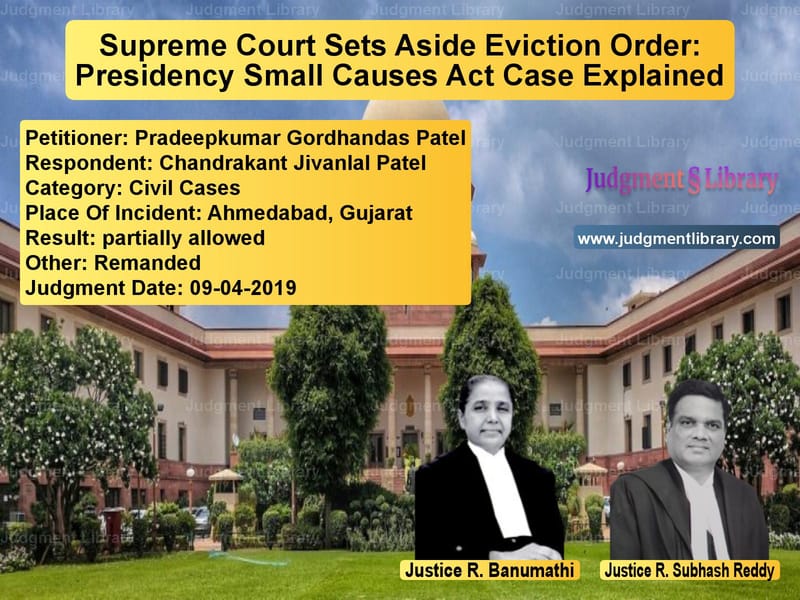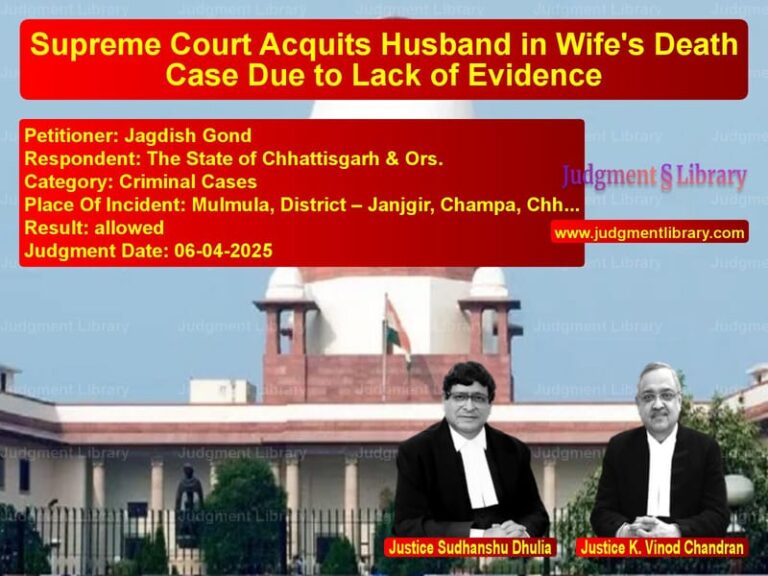Supreme Court Sets Aside Eviction Order: Presidency Small Causes Act Case Explained
The Supreme Court of India, in its judgment dated April 9, 2019, ruled on a dispute concerning property possession and eviction under the Presidency Small Causes Courts Act, 1882. The case, Pradeepkumar Gordhandas Patel vs. Chandrakant Jivanlal Patel, arose from an order of the Gujarat High Court directing the appellant to vacate the premises despite an ongoing civil suit for specific performance. The Supreme Court set aside the High Court’s eviction order, directing that the issue be resolved by the Small Causes Court.
Background of the Case
The appellant, Pradeepkumar Gordhandas Patel, claimed to have purchased the property No.86, Vibhaag-1, Uttar Gujarat Patel Society, Asarwa, Ahmedabad in 1994 and was put in possession. Initially, he filed Civil Suit No.1069 of 2003 for a permanent injunction, but the suit was dismissed. In 2010, he filed Civil Suit No.2929 of 2010 in the Ahmedabad City Civil Court, seeking specific performance of the sale agreement and an injunction against the respondent.
Meanwhile, the respondent, Chandrakant Jivanlal Patel, filed an application under Section 41 of the Presidency Small Causes Courts Act, 1882, seeking vacant possession of the disputed property. The appellant, in response, filed an application under Section 47 of the Act to stay the eviction proceedings until the civil suit was decided. The Small Causes Court rejected this request on January 28, 2013, prompting the appellant to approach the Gujarat High Court.
The High Court, while dismissing the appellant’s plea on June 19, 2018, issued additional directions for him to vacate the premises, leading to the present appeal before the Supreme Court.
Arguments by the Appellant
- The appellant contended that the High Court exceeded its jurisdiction by directing him to vacate the premises when no such order had been passed under Section 41 or 43 of the Presidency Small Causes Courts Act.
- It was argued that since a civil suit for specific performance was pending, his possession could not be disturbed until the suit was decided.
- The appellant’s counsel, Mr. Devadatt Kamat, emphasized that the High Court’s direction to vacate was unwarranted and went beyond the scope of the case.
Arguments by the Respondent
- The respondent, through Ms. Anushree Prashit Kapadia, argued that the appellant’s application under Section 47 was rightly rejected.
- It was contended that the High Court merely affirmed the Small Causes Court’s order and ensured compliance with legal provisions.
- The respondent further submitted that the possession issue should be resolved in favor of the rightful owner as per the application under Section 41.
Supreme Court’s Observations
- The Supreme Court noted that the High Court went beyond its jurisdiction by issuing an eviction order when no such relief was sought.
- The Court emphasized that the Presidency Small Causes Courts Act, 1882, provides a specific mechanism for eviction, which had not been followed.
- It held that the High Court’s decision interfered with the pending civil suit and prejudiced the appellant’s rights.
- The Court reiterated that eviction proceedings under Section 41 must be adjudicated independently and should not be preempted by an appellate court.
Final Judgment
- The Supreme Court partly allowed the appeal.
- The direction by the Gujarat High Court requiring the appellant to vacate the premises was set aside.
- The Court ordered that the Small Causes Court decide the eviction application (P.S.R.P. No.22 of 2011) on its own merits within three months.
- It was clarified that the Supreme Court had not expressed any opinion on the merits of the ownership dispute.
Legal Implications
- This ruling reinforces that eviction under the Presidency Small Causes Courts Act must follow due process and cannot be ordered summarily by higher courts.
- It upholds the principle that courts should not interfere with pending civil suits unless legally warranted.
- The judgment prevents arbitrary dispossession in cases where legal ownership and possession rights are still being litigated.
Conclusion
The Supreme Court’s judgment is a significant ruling ensuring that eviction disputes under the Presidency Small Causes Courts Act follow due process. By setting aside the High Court’s directive to vacate, the ruling reinforces the importance of procedural fairness and protects possessory rights pending civil adjudication.
Petitioner Name: Pradeepkumar Gordhandas Patel.Respondent Name: Chandrakant Jivanlal Patel.Judgment By: Justice R. Banumathi, Justice R. Subhash Reddy.Place Of Incident: Ahmedabad, Gujarat.Judgment Date: 09-04-2019.
Don’t miss out on the full details! Download the complete judgment in PDF format below and gain valuable insights instantly!
Download Judgment: Pradeepkumar Gordhan vs Chandrakant Jivanlal Supreme Court of India Judgment Dated 09-04-2019.pdf
Direct Downlaod Judgment: Direct downlaod this Judgment
See all petitions in Property Disputes
See all petitions in Specific Performance
See all petitions in Judgment by R. Banumathi
See all petitions in Judgment by R. Subhash Reddy
See all petitions in partially allowed
See all petitions in Remanded
See all petitions in supreme court of India judgments April 2019
See all petitions in 2019 judgments
See all posts in Civil Cases Category
See all allowed petitions in Civil Cases Category
See all Dismissed petitions in Civil Cases Category
See all partially allowed petitions in Civil Cases Category







